Rachel Held Evans's Blog, page 56
October 30, 2012
5 Reasons You Should Read My Book Before Forming an Opinion About It
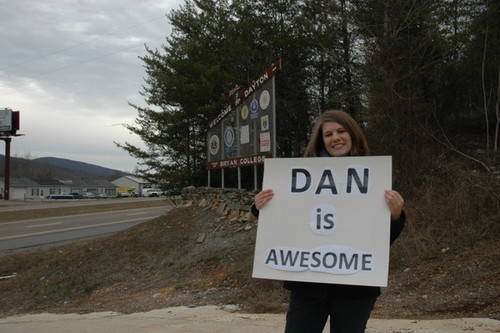
Note: Some of the links in the post are broken; we're working on it! Thanks for your patience.
Borrow it from a library or a friend if you must, but please read my book before you publicly praise or condemn it. Here are five reasons you should:
1. Because it’s embarrassing to have to tell your friends you haven’t actually read the book in question after you’ve just engaged in an eighteen-minute diatribe about it at a dinner party. I know because I’ve tried this once or twice before and, take it from me, there’s no cool way to pull yourself out of that hole. (Your best bet: Pointing out the window and shouting, “Look! A binder full of women!” The conversation will then proceed to politics and no one will remember what you said.)
2. Because I guarantee you will laugh out loud at least once while reading A Year of Biblical Womanhood. And I think we could all use a good laugh right now.
3. Because the book is much more than the playful, humorous experiments in which I take “biblical womanhood” to its literal extreme—praising my husband at the city gate, growing out my hair, sitting on my roof, covering my head, etc.—activities that are clearly meant to be hyperbolic and provocative. The book is packed with research, stories, examinations of Hebrew and Greek, interviews, analysis, and perspectives from a variety of biblical interpreters as well as everyday women practicing “biblical womanhood” in different ways (an Orthodox Jew, an Amish housewife, a pastor, a polygamist family, a Quiverfull daughter, etc.) . My goal is to make readers first laugh, and then think, about the ways in which we invoke the phrase “biblical womanhood,” because I believe both the Bible and womanhood are more complex than a list of rules and acceptable roles. Any inconsistency in my hermeneutic is intentional and acknowledged, meant to point to the inconsistency of a patriarchal hermeneutic. (See some of my past posts on the subject to learn more, especially "Better Conversations About Biblical Womanhood Part 1 and Part 2" and "Complementarians are selective too.")
4. Because you will notice that the few (though widely shared) negative reviews have come exclusively from outspoken complementarians/patriarchalists. If there is a divide then, it is not between those who value the Bible and those who do not, but between those who believe the phrase “biblical womanhood” belongs exclusively to a complementarian view of gender and those who think there’s more to it than that. I’ve been encouraged to receive positive reviews from biblical scholars like Ben Witherington, Peter Enns, Roger Olson, Daniel Kirk, and Brian LePort, as well as from conservative evangelical women who weren’t necessarily expecting to like the book or who may differ from me regarding some gender issues. (See Amazon for additional reviews. I’ll share more on Twitter and Facebook.) Those who simply accuse me of not taking the Bible seriously are dodging the main argument of the book by refusing to engage its message and focusing instead on its format.
But by all means, read and engage reviews - both positive and negative - from folks who have read the book. This book was meant to be a conversation-starter!
5. Because the sentence “I didn’t tell them they were my servant girls” really does need some context.
A Year of Biblical Womanhood officially releases today, which means you can find it at just about any bookstore as well as online. And like I said, if you don’t want to buy it yourself, you can always check it out at a library or borrow from a friend. Just do me a favor and read it before you make me your hero or your villain, because neither a halo nor a Hitler mustache particularly suits me. I’m just another sinner, saved by the grace of Jesus.
Note: I’ll write more about our adventure in NYC later this week. Looks like we will be here longer than expected. Prayers for those still stranded, out of power, or struggling to make sense of all the loss and thwarted plans that have resulted from this storm. May we hear God’s whisper above the wind.



October 29, 2012
YBW Launch Week Giveaway
Thomas Nelson is hosting a special giveaway to celebrate the launch of A Year of Biblical Womanhood this week!
If you buy A Year of Biblical Womanhood book before Saturday November 3rd, 2012 at 11:59pm Thomas Nelson will give you some freebies! You'll get:
Digital copy of the bookBonus materialDan's JournalHow To Claim Your Free DownloadsAttach a legible image or PDF of your proof of purchase to an email and send it...
TO: NonFictionMarketing@ThomasNelson.com
SUBJECT: YBW Launch Week Giveaway
It's important to include the subject of the email exactly as it appears above so the good folks over at Thomas Nelson can keep track of your request.
Bonus!If you're one of the first 10 people to buy the book this week and send in your proof of purchase, you will get a free downloadable audio version of the book!
Questions?If you have any questions about this giveaway, direct them to Thomas Nelson at:
NonFictionMarketing@ThomasNelson.com



October 28, 2012
A Year of Biblical Womanhood Release Week Starts with “The View”
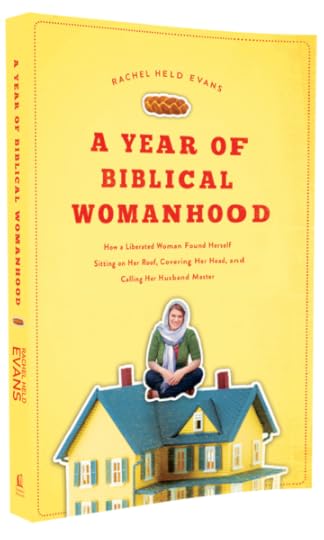
UPDATE: Monday's appearance on The View has been cancelled/postponed due to weather. Will keep you posted. In the meantime, everyone stay safe!
This week is release week for A Year of Biblical Womanhood, and we’re kicking it off in style with a visit to the ladies at The View!
Dan and I will be talking with Whoopi, Barbara, Sherri, Joy, and Elisabeth on Monday morning at 11 EST. If you want to tweet during the show, use #BiblicalWomanhood.
Release week is an important week for sales, so if you’ve been waiting to buy, this would be the time. Copies should be available at all major retailers by Tuesday, though most already have copies on shelves. My publisher, Thomas Nelson will be announcing a special giveaway for folks who buy this week, so be sure to hold on to those proofs of purchase.
In the acknowledgements section of the book, I write this: “I am grateful beyond words for my readers at rachelheldevans.com, who inspired me to write this book and whose comments, criticisms, stories, and questions made it what it is. Our little online community feels like home to me in so many ways. Your honesty and grace are rare gifts that I hope never to take for granted.”
Thank you once again for your encouragement and support through all the ups and downs of this crazy project.
I hope you enjoy the book. I wrote it for you!
More info:
Endorsements:
“A bitter-sweet cocktail of wisdom and absurdity that will charm you, entertain you, seduce you and, finally, instruct you! A Year of Biblical Womanhood is funny, droll, charming, and deadly serious, all in one set of covers.”
-Phyllis Tickle, author and lecturer
“A triumph! Rachel Held Evans has written a comprehensive, impeccably researched, heartfelt, whimsical, scripture-honoring book about the role and experience of women in Christian society. This magnificent achievement should be required reading in every church, home, student ministry, college, and seminary in the world. Eshet Chayil!”
-Ian Morgan Cron, author of Jesus, My Father, the CIA, and Me
"Rachel Held Evans is my kind of woman, Christian, and writer. She cares too much about the Bible to read what it says without wrestling with what it means. Rachel's new book is full of humor, humility, and truth."
-Glennon Doyle Melton, author of Momastery.com
“With curiosity, honesty, and humor, Rachel Held Evans takes readers along on her year-long adventure in Biblical womanhood that manages to be both hilarious and thought-provoking.”
-Gretchen Rubin, author of The Happiness Project
"Funny and fearless, Rachel Held Evans is twice the woman I'll ever be."
-Daniel Radosh, writer for The Daily Show with Jon Stewart and author of Rapture Ready!



October 26, 2012
Rescheduling Blacksburg
Hey
folks! If you were planning to catch me in Blacksburg, Virginia this weekend at
Blacksburg United Methodist Church, you should know that we have rescheduled
that event (date TBA) due to potential air travel delays as a result of Sandy. Will
keep you posted on the new dates! Thanks for understanding.



October 25, 2012
15 minutes
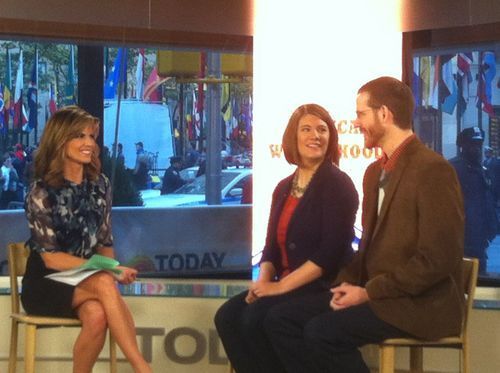
photo by Kristin Clifford
Today is Team Dan & Rachel’s ninth anniversary and so far we have celebrated by staying home, eating a frozen lasagna, drinking cheap red wine, and watching SNL reruns…because that’s EXACTLY what we needed after last week.
I was in Georgetown, Kentucky speaking to the delightful folks of the Kentucky Baptist Fellowship last week when my phone started to ring. The Huffington Post, The Guardian, People Magazine, The Today Show, The View—everyone suddenly wanted to talk about A Year of Biblical Womanhood. Early reviews came pouring in. Many were good, but some were bad. Some people called me a heretic; others accused me of mocking the Bible I so love. In the middle of all this, I gave a lecture on how to handle criticism with a thick skin and tender heart. I cried on the airplane on the way home.
After Kentucky, Dan and I had just one day to run to the mall and get something decent to wear for the Today Show. (Dan has spent more on clothing in the past four days then he has in the past nine years…which, believe me, says more about the past nine years than the cost of our fancy J.C. Penny/Belk media-wear.) Then it was off the New York City, where, like a big country bumpkin, I asked the barista at the Starbucks on 44th and Broadway about store hours. “Um, 24?” she responded, confused.
We met up with some friends in the city, which was a good way to distract ourselves from that heavy sense of anticipation that followed us everywhere we went. This would be Dan’s first interview ever.
You have to get up early for the Today Show. It’s kind of like a Benedictine monastery in that way. I told the ladies in hair and makeup that I felt like I was getting ready for the Hunger Games and they were my Cinna. Dan says I laugh really hard at my own jokes when I'm nervous. Everyone was super-nice, though. Natalie said some really kind things about the book, which I don’t exactly remember because I was mesmerized by her high, high heels. We didn’t get to meet Barry Manilow, but he was around there somewhere.
The interview went well, I think. I confess I haven’t watched it back. I guess I still feel a bit too fragile to indulge in the inevitable self-critique.
By the time we got home we had booked The View…which, unless our planes get blown away by a hurricane, should happen live on Monday. Dan can now correctly identify Barbara, Whoopie, Sherri, Elizabeth, and Joy, so we’re good to go.
All of this has left me with little time to process, which for an INFJ is utterly exhausting. I’m struggling to write, struggling to make sense of everything, struggling to accept both the criticism and the praise. Obviously, the blog has suffered, and I thank you for your patience. We’ll return to our “regularly scheduled programming”—the Esther series, the Women of Valor features, “ask a” interviews, Sunday Superlatives, etc.—as soon as things have calmed down a bit. Next week is release week, so expect some excerpts, giveaways, and announcements.
The only thing that has emerged with total clarity in all of this is just how thankful I am to have Dan by my side. He has listened, he has fielded calls, he has drawn boundaries, he has responded to critiques with wisdom and grace, he has cheered me on, he has aced interviews, he has been strong, he has been vulnerable, he has been funny, he has shopped. Never in my life have I been happier to be in this partnership.
We were driving to Chattanooga for something like the 29th time a couple of days ago, with the windows down and the golden light of fall streaming in. We were tired, listening to NPR, enjoying the quiet, speaking only to remark at the color of the leaves. And in that moment, I felt happier than I felt sitting on the set of the Today Show, happier than I felt watching my Amazon rank jump up (and then go back down), happier than I felt when a stranger grabbed my arm in Times Square and said, “you did great!, happier than I felt when a woman emailed me and said that for the first time in 20 years she was interested in reading the Bible again because I’d helped her believe that maybe it wasn’t just bad news for women. And I realized in that moment that these little joys—golden light, pleas for listener support on NPR, relationships, long stretches of open road—belong to us all, always. Fifteen minutes of fame won’t make us happy, but fifteen minutes of mindfulness just might.
I am so grateful—for all these opportunities, of course, but mostly for the kindness of other people: the reader who shoved a $50 Starbucks card into my pocket at a signing; the flight attendant who gently patted my arm; Dad’s idea to make my favorite comfort food for dinner and Mom’s faithful execution of pork loin, rice, and fried apples; Marvin and Brandon at Belk; Dan’s shoulder; a call from my sister; readers who pile into minvans and drive many miles just to talk, friends who understood why, with all this good publicity, I would just need a good, long cry.
And I am grateful for you—for your support, your patience, and your continued readership. This project has been a wild ride from the beginning, and I get the idea that we’re on the last big, scary drop.
Let’s just hope I don’t throw up on Barbara Walters.



October 18, 2012
"A Year of Biblical Womanhood" - Frequently Asked Questions
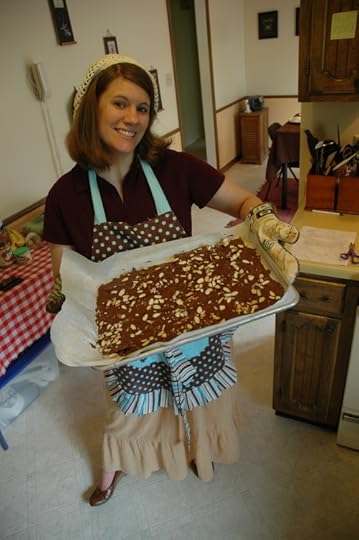
1. How on earth did you get this idea?
Growing up in the conservative evangelical subculture, I was often told that I should strive to practice “biblical womanhood.” In response to second-wave feminism, evangelical leaders have been debating the role of women in the home, church, and society in recent years, and as a result, Christian women receive a lot of mixed messages about what it means to be a woman of faith. While many hail “biblical womanhood” as the ideal, few seem to agree on exactly what it means, and any claim to a “biblical” lifestyle is inherently selective. (After all, technically speaking, it is biblical for a woman to be sold by her father to pay of debt, biblical for her to cover her head when she prays, biblical for her to be one of many wives.)
I wanted to challenge the idea that “biblical womanhood” could be reduced to a list of roles and rules, and I wanted to do it in a creative, disarming way. I was thinking about this in the shower one morning, when I got a crazy idea: What if I tried it all? What if took the notion of biblical womanhood literally to show that it’s not as simple as it may sound?
As a result, I found myself growing out my hair, making my own clothes, caring for a computerized baby named Chip, consulting with Orthodox Jews, travelling to Amish country, interviewing a real “sister wife,” sitting on my roof, covering my head, and calling my husband “master.”
2. You do realize that A.J. Jacobs has already done this, right?
I loved The Year of Living Biblically and have always wanted to see a woman take on a similar experiment. And after living biblically as a woman for a year, I think A.J. had it easier!
3. Are you doing this to make fun of the Bible?
Absolutely not! I love the Bible. As a Christian, I believe that the Bible represents a sacred collection of poems, stories, accounts, and letters that are inspired by God and shared by his people. As an honest reader, I confess that there are times when the Bible touches me, times when the Bible troubles me, and times when the Bible confounds me. As an interpreter, I acknowledge that my understanding of the Bible’s meaning is fallible. My purpose in embarking on this project is not to belittle or make fun of the Bible, but to creatively investigate our application of it…because I hate seeing it reduced to an adjective or used to restrict the roles of women.
4. What is your position on gender roles? Are you a feminist?
I’m a thoroughly liberated beneficiary of the feminist movement, complete with a blossoming career and egalitarian marriage. I strongly support women at all levels of leadership in the church, home, and society, and am suspicious of anyone who would claim that the Bible presents just one “right way” to be woman.
5. Did Lifeway really ban your book because you used the word “vagina”?
We don’t know exactly why Lifeway will not be carrying A Year of Biblical Womanhood. My publisher had warned me that if I left the word “vagina” in the book, it might not be carried by the Christian bookstore. I left it in anyway, and sure enough, Lifeway chose not to carry it in stores. But it’s important to note that this could be a result of many other factors besides “vaginagate.” And, of course, Lifeway has the right to carry whatever books they please. (Read more about “vaginagate” here.)
6. What did your husband think of the project?
My husband Dan is awesome. In fact, in deference to Proverbs 31:23, I literally praised him as such at the city gate! Dan kept a journal throughout the project, and excerpts from it are included in the book…so you can find out exactly what he was thinking when I called him “master” for a week!
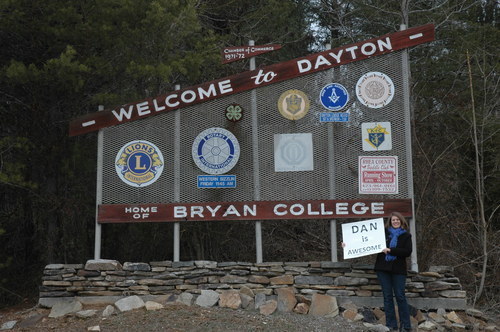
7. Can I read an excerpt from your book?
Yes. Sign up for my super-low-volume newsletter and get a link to download the first two chapters of A Year of Biblical Womanhood for free.
6. Where can I buy the book?
Check out the book page for a list of retailers.



October 17, 2012
Biblical Womanhood Tips
Does this project sound interesting? Here's how you can learn more:
Visit the book pageSign up for my super-low-volume newsletter and get a link to download the first two chapters of A Year of Biblical Womanhood for free.Tweets about "#biblicalwomanhood"


October 15, 2012
When our interpretations differ…
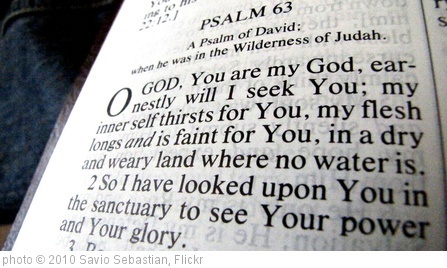
[Note: We will return to our series on the book of Esther next week, with a discussion on the complex character of Mordecai, after I’ve returned from my travels.]
As we discussed last week, the Bible is an eclectic collection of letters and laws, stories and songs, prophecies and proverbs, philosophy and poems, spanning thousands of years and multiple cultures. And as such, it lends itself to multiple, competing interpretations. It always has.
I believe that all Scripture is inspired by God and useful for teaching, challenging, correcting, and training in righteousness, so that the people of God are equipped for good works. I acknowledge and submit to the authority of Scripture, even though I often wrestle with it, even though it frustrates and confuses me at times. And I try to read Scripture with ultimate deference to the teachings of Jesus Christ, who said that all of its laws and stories and prophecies could be boiled down into two principles: 1) love God, 2) love people.
The fact that the Bible lends itself to competing interpretations should be cause for celebration rather than dismay, for these competing interpretations among people of faith who love and value Scripture help bring us into relationship with one another and with God. They bring us into conversation. They remind us that faith isn't simply about believing something in isolation, but about being part of a community.
What is perhaps most frustrating about engaging in such conversations within the evangelical community in particular, however, is that differences regarding things like Calvinism and Arminianism, baptism, heaven and hell, gender roles, homosexuality, and atonement theories often disintegrate into harsh accusations in which we question one another’s commitment to Scripture. In some cases, folks are so committed to their particular views on these issues they seem incapable of making a distinction between the Bible itself and their interpretation of it, and so any critique of that interpretation is seen as a critique of Scripture itself! And so we miss one another entirely. Instead of a lively, impassioned debate about the text, we engage in lively, impassioned debates about one another’s commitment to the faith.
Now, just because I have observed this phenomenon does not mean I am immune to perpetuating it. Often I find myself questioning others people’s motives; often I find myself assuming the worst; often I am too lazy (or threatened or fearful or angry) to hear my fellow Christians out. But the fact that someone interprets the Bible differently than I do does not automatically mean that the person does not love or value the Bible as much as I. It doesn't mean they are trying to hurt me, or hurt women, or hurt Christianity.
For constructive dialog to happen, Christians must stop conflating differences in interpretation of Scripture with differences in commitment to Scripture. We must respond to one another’s questions, arguments, and ideas in kind, with more questions, arguments, and ideas, rather than avoiding the conversation altogether by dismissing one another as unfaithful.
I’ve seen this work in beautiful, constructive, and God-honoring ways…and I’ve seen it fail miserably. Interestingly, it seems to work best in communities that also value gathering around The Table for communion—perhaps because The Table reminds us that it is our shared brokenness and our shared healing through Jesus that ultimately unites us as brothers and sisters in the faith.
***
So how can we do a better job of fostering better conversations about the Bible? And is there room here to also debate the nature of Scripture – like what we mean by “authority” or “inerrancy” or "inspiration”? Where do we draw the line?
(Please keep your comments positive!)



October 14, 2012
Sunday Superlatives 10/14/12

Keeping Superlatives short today as I prepare to head to North Carolina and Kentucky next week. Let me know if I’ll see you there!
Around the blogosphere...Best Advice:
Donald Miller at Storyline with “Move through the fear rather than around it”
“Strong people admit their fears, while frightened people fake their way through it.”
Best Analysis:
Suji Pak at BioLogos with “Pre-Modern Readings of Genesis 1”
“For these pre-modern Christians, then, Scripture’s authority and infallibility were not staked upon its scientific accuracy; rather, Scripture’s authority and infallibility meant that all Scripture is inspired by God “and is useful for teaching, for reproof, for correction, and for training in righteousness” (2 Tim 3:16). Simply put, the authority and infallibility of Scripture meant that all Scripture should edify the church—namely, be useful and build up the church in right teaching and an ethical life.”
Best Conversation-Starter :
Addie Zierman at Deeper Story with “In Defense of the 4-Letter Word”
“And I think that the curse words themselves are not actually the problem. It’s our misuse of them. It’s the way we overuse them, throw them away. It’s the way we lob them angrily at one another like grenades. We do this over and over, and we turn them into blunted, powerless things. And that, most of all, is the problem.”Best List:
Joe Carter with “The 50 Best & Worst Childhood Fads”
Best Sermon:
Nadia Bolz-Weber with “A Sermon on Hacking Off Our Own Limbs for Jesus”
“And here’s the thing…that story? The story of God’s redeeming work for all of creation that happens in the birth, life, death and resurrection of Jesus Christ that we tell every single week …that story? It’s an axe. And the Eucharist is an axe. And to be sure, the confession and absolution is an axe.”
Most Eye-Opening:
Meredith Birkett with “Child marriage continues cycle of abuse, poverty for girls in over 50 countries”
Bravest:
Glennon Melton with “A Bicycle Built for One”
“How often do we, as mamas – as grown-ups – find something, something relatively healthy- that is REALLY FUN? That makes us laugh and makes our bodies feel like we’re soaring and makes us feel FREE? I felt free on that bike in Target. Like a child before she learns how hard life is. So I bought that bike. It’s in my garage right now, waiting to take me for a ride when I feel sad. It’s not waiting for my husband, or my daughters, or my son. There are no seats for them on that bike. It’s a bicycle built for ONE. Just me. All mine. Waiting to take me away for a little while.”On the blog...
Most Popular Post:
"I love the Bible"
"And when those stories weren’t enough, when the words themselves would not suffice, the Word became flesh and dwelt among us, laughed among us, wept among us, ate among us, told more stories among us, suffered among us, died among us, and rose among us. The Word entered our story and invited us into His."
So, what caught your eye online this week? What's happening on your blog?



October 13, 2012
Mary Magagula and Evelyn Shongwe – Women of Valor
By Rev. Michaele LaVigne
Mary Magagula and Evelyn Shongwe are my spiritual mothers and heroes. I met them while my husband and I lived in Swaziland for a year as volunteer missionaries. They opened their arms and hearts wide to me, treating me as one of their own, allowing me to walk in stride with them. While we were living there, this tiny southern African nation had the unhappy distinction of having the highest HIV infection rate per capita in the world. With a population hovering around one million, 40% of women ages 15 to 40 in this tiny tribal nation were HIV positive.
Poverty, gender inequality, and long-standing cultural norms had created the perfect nightmare. The web was woven silently and slowly, and was a massive entanglement before it was noticed. Against this backdrop of national crisis and confusion, Mary and Evelyn are steady, peaceful, deliberate, and joy-filled ambassadors of hope.
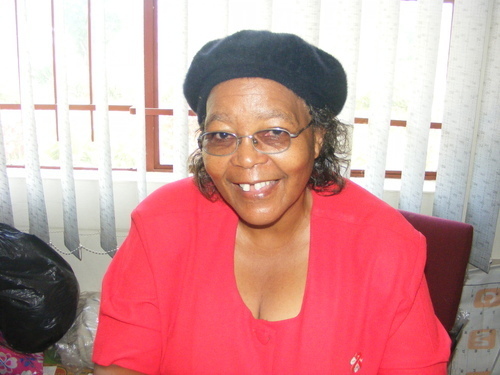
After she retired from a long career as a nurse, Mary took a part-time position in a private clinic, making good money and enjoying time with family. Yet when a local denominational leader challenged the area churches to do something about the AIDS epidemic, she had a nagging suspicion God would not leave her at the cushy clinic job. Finally, Mary told me, God asked her a question. “You’ve had a great career for yourself. Now what will you do for me?” She resigned her position and began exploring what she might be able to do with this monumental problem.
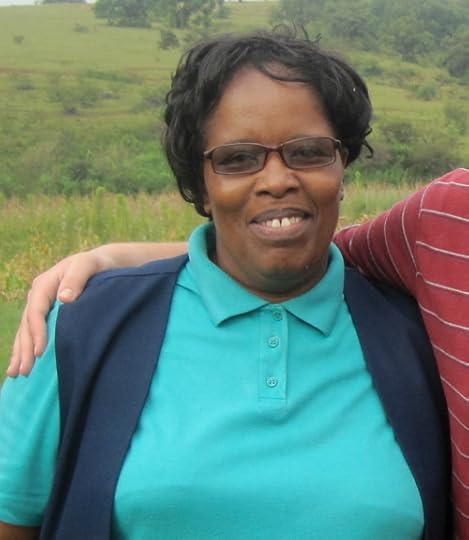
Evelyn’s husband Cariot served as a pastor over twenty years before he was elected to district leadership in their denomination. Before he spoke the words that shook Mary, he and Evelyn had personally ministered to hundreds of people in their churches who were affected by or infected with HIV. When Mary stepped forward, she had a ready-made partner in Evelyn.
Not really knowing where to begin, they decided to do an assessment of the needs in their community. Going door to door in the slum nearest their own houses, they found more injustice, pain, and death in the first day than they could have imagined. They saw a thirty year old woman laying in her own filth and vomit, huddled in a closet; they saw men in the prime of life unable to get out of bed, let alone take care of their families; they met twelve year olds who had become the oldest living person in their homes.
What amazes me is that this did not paralyze them. Evelyn told me they would make it through one house visit, then weave back through the maze to their car where they would cry and pray before going back up to the next house. Confronted by such magnitude of disease and chaos and brokenness, they moved prayerfully past hopelessness and into action. Again and again and again.
Now, six years later, the result of their bold perseverance is the Nazarene HIV/AIDS Task Force. It is the most valiant, courageous, and dedicated group of women I have ever encountered – an army of “gogos” (grandmothers) and an odd assortment of other unlikely heroes. Each Care Provider has up to 20 clients that she visits weekly. Care Providers instruct family members on caring for the sick; they encourage people with HIV to test and get treatment; and when supplies are available, they bring parcels of food and sanitary products.
But the most important thing Care Providers bring their clients is hope. They share love and compassion with men, women, and children who are suffering both from their disease and the shame associated with it. Without words they communicate to whole communities that there is hope in treatment and Jesus Christ; that compassion brings healing; and that there can be freedom from shame and fear.
Serving as the first Care Providers, Mary and Evelyn soon realized that people needed to learn how to live and thrive while being HIV positive. Although they began as a way for clients to gain strength from one another, the Task Force’s HIV support groups have now become universities of empowerment and activism. Support group members educate their communities, generate income with gardening and soap making projects, and often serve as Care Providers themselves. Women once beaten down and ready for defeat are now leading the charge into battle.
Their gentle generals are two gogos themselves: Mary Magagula and Evelyn Shongwe. Every single day these two hear story after story of poverty, sexual assault and abuse, orphanhood, hunger, despair, and death. And every single day they confront that darkness with the peace that passes all understanding, joy unspeakable, hope unwavering, and love unlimited. These are women filled to overflowing with the Holy Spirit. These are women of valor.
***
Michaele is an ordained elder in the Church of the Nazarene. She currently serves as the Equipping Pastor at Bethany First Church of the Nazarene in Oklahoma, where she connects people to service opportunities in the church and community. One of her passions is to help women find the gift of transparent relationships in which they can learn from one another. She and her husband Brent served as volunteer missionaries with the Swaziland Partnership in 2009-2010 and have plans to return often. Evelyn and Mary’s Task Force serves thousands of people all over Swaziland, operating solely on donations. Go to http://www.swazipartners.org/give to learn more about their ministry and give online.
This post is part of our Women of Valor series. Eshet chayil—woman of valor— has long been a blessing of praise in the Jewish community. Husbands often sing the line from Proverbs 31 to their wives at Sabbath meals. Women cheer one another on through accomplishments in homemaking, career, education, parenting, and justice by shouting a hearty “eshet chayil!” after each milestone. Great women of the faith, like Sarah and Ruth and Deborah, are identified as women of valor. One of my goals after completing my year of biblical womanhood was to “take back” Proverbs 31 as a blessing, not a to-do list, by identifying and celebrating women of valor. To help me in this, you submitted nearly 100 essays to our Women of Valor essay contest. There were so many essays that made me laugh, cry, and think I’ve decided that, in addition to the eight winners we featured in August, I will select several more to feature as guest posts throughout the fall.
We have honored a single mom, a feisty professor, a midwife, a foster parent, an abuse survivor, a brave grandmother, a master seamstress, a young Ugandan woman who reached out to a sister in need, and many more.
Read t he rest of the Women of Valor series here.



Rachel Held Evans's Blog
- Rachel Held Evans's profile
- 1710 followers























